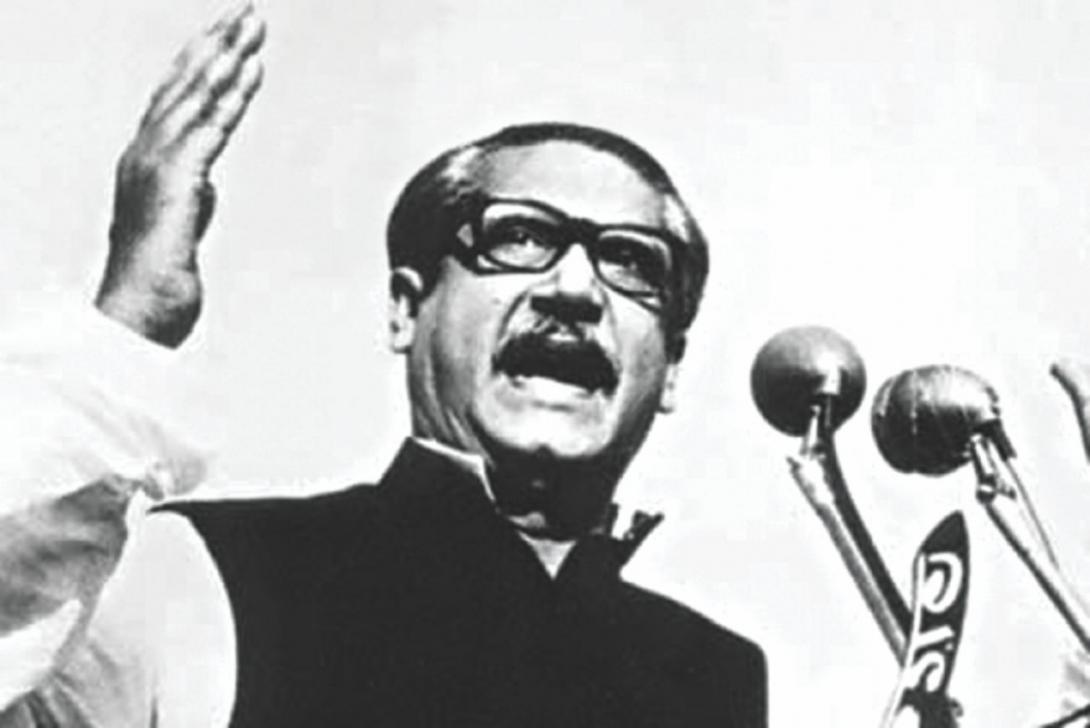This may be my last message. From today Bangladesh is independent. I call upon the people of Bangladesh wherever you are and with whatever you have, to resist the occupation army. Our fight will go on till the last soldier of the Pakistan Occupation Army is expelled from the soil of independent Bangladesh. The final victory is ours. Joy Bangla!
– The Declaration of Independence on the night of March 26, 1971, made minutes before his arrest by Pakistan Army.
March 17, 2021 – Today is the 101st anniversary of Sheikh Mujibur Rahman, the father of Bangladesh, or more fondly referred to as ‘Bangabandhu’. As the Bangladesh government carries on with the much-awaited (and unfortunately postponed due to COVID) centenary celebrations of Mujibur Rahman’s birth anniversary, it seems right to talk about the man whose dedication, whose strength, whose will-power, whose justness and fairness, brought Bengalis the much-desired freedom from the tyranny and genocide that had been unleashed on them by West Pakistanis (now Pakistan).
Mujib & the story of Bangladesh: The Beginning
Soon after the partition from India, the West Pakistani elites motivated by a (mis)conception of cultural and ideological superiority, started promulgating policies to undermine and prevent the growth of Bengalis: Be it the 1948 proclamation by Muhammad Ali Jinnah, that” Urdu and only Urdu” would be the federal language of Pakistan; or the lack of jobs in the military sector because the higher echelons of West thought the Bengalis were not “martially inclined”; or the deliberate discrimination of Bengalis in developmental and economic policies. The hatred of the Urdu-speaking West Pakistanis towards the Bengali population of East Pakistan though ill-founded was definitely deep-rooted.
It was then, that Sheikh Mujibur Rahman, the charismatic Bangabandhu, and his Awami League Party devoted their every task towards bridging the gap between the Bengalis and the West Pakistanis. An outspoken and keen advocate of equality, Mujib soon found himself behind bars due to his campaigning and open criticism of the Muslim League’s resolve to make Urdu the only state language of Pakistan in 1948. It was then in 1956, as “East Bengal” was renamed “East Pakistan”, Mujib, fearing loss of cultural identity, demanded that the verdict be left with the Bengalis and only the Bengalis.
“Sir [President of the Constituent Assembly], you will see that they want to place the word “East Pakistan” instead of “East Bengal.” We had demanded so many times that you should use Bengal instead of Pakistan. The word “Bengal” has a history, has a tradition of its own. You can change it only after the people have been consulted.”
– Sheikh Mujibur Rahman in the Constituent Assembly in 1956
In 1958, as General Ayub Khan revoked democracy and imposed the martial law, Mujib was once again imprisoned, this time till 1961. With the increase in the atrocities and the increased neglection of the government towards East Pakistan, in 1966, Bangabandhu announced his ‘Six Point Movement’. The movement soon became the turning point in Bangladesh and in Mujib’s story.
The six points of this proposal had a single agenda – to end the exploitation of East Pakistan and ensure fair treatment and opportunities for the Bengali masses. As one can guess, the West Pakistan government vehemently rejected the proposal, and Mujib was labelled a separatist. However, among the East Pakistanis, this Six Point movement gained widespread favour and eventually led to Mujib re-christening ‘East Pakistan’ as ‘Bangladesh’ in 1969.
“There was a time when all efforts were made to erase the word “Bangla” from this land and its map. The existence of the word “Bangla” was found nowhere except in the term Bay of Bengal. I on behalf of Pakistan announce today that this land will be called “Bangla Desh” instead of East Pakistan.”
–December 5, 1969, Bangabandhu declared at a public meeting
As the cyclone of 1970 crippled East Pakistan, General Yahya Khan and Tikka Khan launched “sweep operation” (senseless and cruel mass killings, rapes and torture in every village of East Pakistan) that left Bangladesh struggle for survival. Mujib’s March 7 speech led to the thunderous outcry of “Joy Bangla” and finally it was his declaration of Independence on March 26, 1971 that renewed the will and courage of the people.
As the ‘First President of Bangladesh’ Mujib modelled his policies and initiatives towards ensuring national unity and strength. Left with the humongous task of rebuilding the nation which was not just economically drained but also suffered from various societal issues owing to the trauma of bitter aggression by the then Pakistan Army, Mujib became a source of strength and inspiration for his people. His ideals of secular co-existence, democracy, secularism and socialism, became the bedrock of today’s Bangladesh. It is therefore not at all surprising that he is so fondly remembered by not just Bangladeshis but also by many people internationally.
“I have not seen the Himalayas. But I have seen Sheikh Mujib. In personality and in courage, this man is the Himalayas.”
–Fidel Castro, Former Prime Minister of the Republic of Cuba

